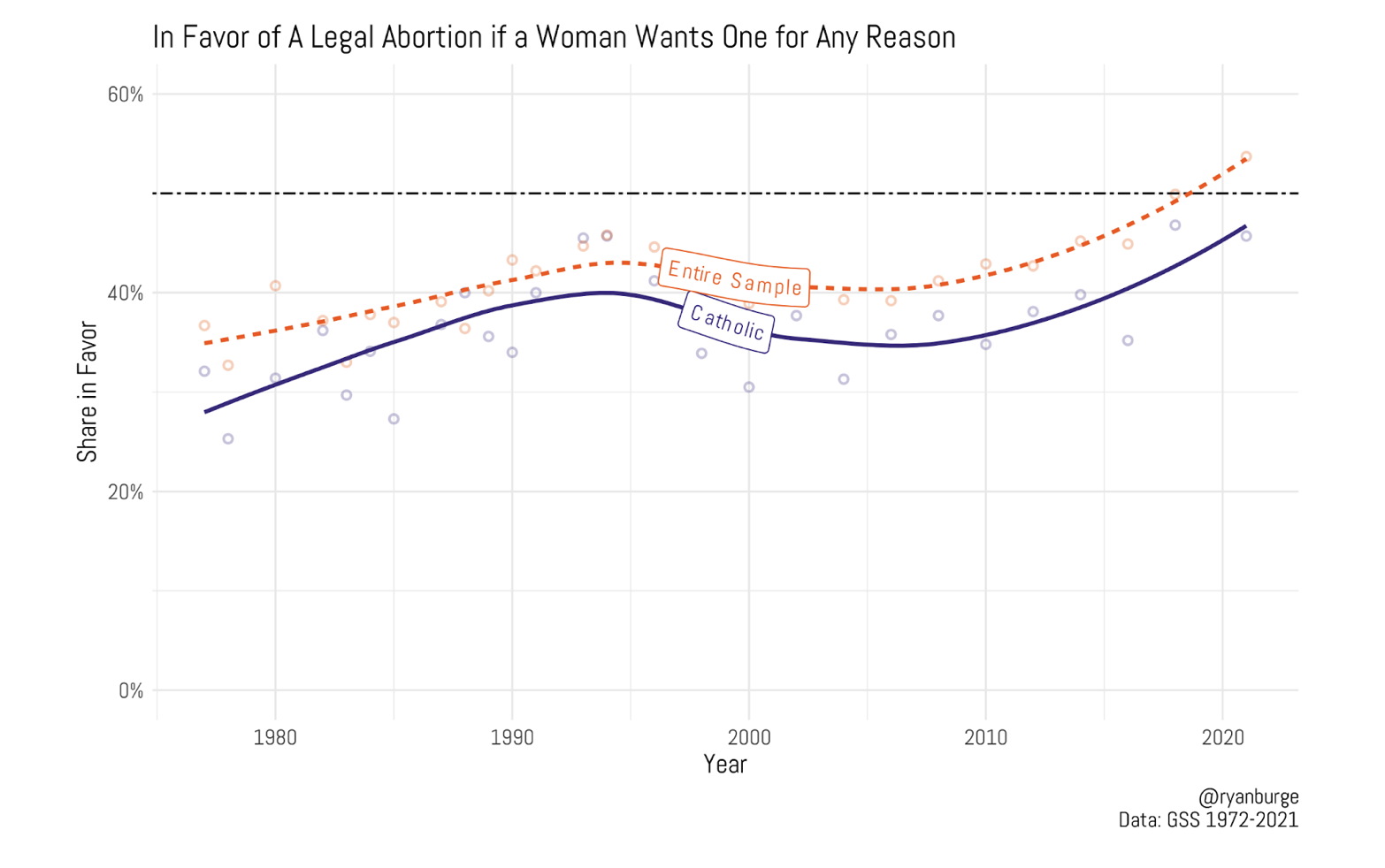It may be the most important U.S. Supreme Court decision of the last fifty years.
A leaked draft of a majority opinion, written by Justice Samuel Alito, would effectively dismantle the legal framework around abortion that was established in the 1973 decision Roe v. Wade. In its wake, states would have almost complete freedom to regulate abortion however they saw fit, including enacting a total prohibition.
Among those who study American religion and politics, it’s long been established that the earliest political voices seeking to restrict access to an abortion were members of the Catholic Church. For centuries, the catechism has taught that life should be protected at all stages — from conception to natural death. Thus, the tens of millions of American Catholics should be the standard bearers for the pro-life movement in the United States.
But here is an important question for journalists: Will most Catholics applaud the end of Roe? The data tells a nuanced story about how the average Catholic thinks about the issue of abortion access. As always, it’s important to note if polls pay any attention to how often Catholics attend Mass.
Looking back to the time period immediately after the Roe v Wade decision in 1973, it’s clear that the vast majority of Catholics were not comfortable with the concept of a woman obtaining an abortion for any reason, which not was out of step with how the average American felt.
For instance, in 1985 about 35% of Catholics were in favor of abortion demand. It was 39% of the general public. In the 1990s and 2000s, abortion opinion was relatively stable, but then things began to shift in 2010. From that point forward, the share of Catholics who supported abortion began to rise, which paralleled a shift in the overall opinion of the American public.
By 2021, fifty-three percent of Americans supported abortion on demand along with forty-five percent of Catholics. But, it’s worth noting that the contours of the two lines run in almost perfect unison. As the country moved left on abortion, so did the average Catholic.
Those synchronized movements in abortion opinion also appear when the sample is broken down into Democrats, Independents and Republicans.
For Republicans, support for abortion has stayed relatively low since the 1970s, although it has certainly ticked up since 2000. But, it’s fair to say that there’s not much difference between a Catholic Republican and a Republican in general when it comes to abortion opinion.
However, Democrats offer a different portrait.
The first trend that is worth noting is how quickly Democrats have shifted to the left on abortion. In 2010, about half of Democrats favored abortion. Just 11 years later it was over 70%. That same shift is also evident among Catholics who identify as Democrats. In 2010, about 40% were in favor — today it’s just over 60%.
Note the same shift (twenty points), although the average Catholic Democrat is still 10 points less supportive of abortion than the average Catholic.
The share of Catholics attending mass regularly has plunged over time. So, how much of this shift is predicated on Mass attendance?
Social scientists assume that exposure to religious teachings and traditions should have a measurable impact on the political views of parishioners, especially when it comes to issues that have a clear moral component.
When looking at the trend lines from 2014 and 2021, there are shifts that are worth considering. For instance among Catholic Republicans who describe their attendance as never or seldom, they have become less permissive of abortion over time. For Democrats, the shift in the other direction is not nearly as large.
However, among those who attend Mass more frequently, there’s essentially no evidence that their views of abortion have shifted in a significant way over the last seven years.
For Democratic Catholics who attend Mass weekly, they are perhaps five points more supportive of abortion today than in 2014. Among Republicans who go to Mass weekly, about 20% support abortion on demand — which represents no change from 2014. There is some evidence that Republican Catholics who attend multiple times a week have become more conservative on abortion, but this group represents just 2.5% of Catholics in the United States.
Speaking broadly, there’s evidence in the data that the Catholic view on abortion is heavily mediated through political partisanship, which is noteworthy because Catholics are evenly split between Republicans and Democrats in 2021 (around 42% each). Thus, 60% of Democratic Catholics will recoil at the end of Roe, while the same share of Republican Catholics would applaud the move by the Supreme Court.
CONTINUE READING: “The Catholic Church Has Historically Opposed Abortion — But What About Catholics in the Pews?” by Ryan Burge at Religion in Public.
FIRST IMAGE: Publicity photo from the National March for Life, posted by the Catholic University of America.



